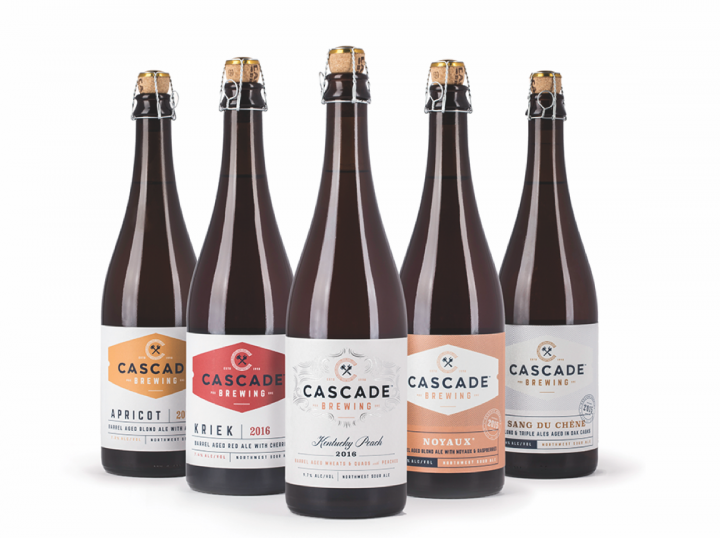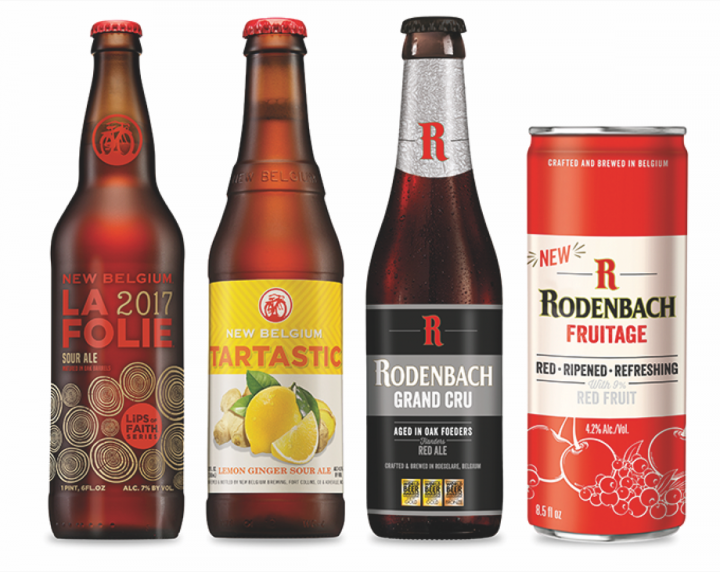
“I’m definitely seeing more people seeking out sour beers,” says Greg Norton, owner of Bier Cellar, a beer and wine shop in Portland, Maine. “They come into the store and ask where the sours are.” Norton believes this increased demand is due to improved availability of affordable sour styles such as goses, Berliner weisses and kettle sours.
Jason Glunt, owner of Salud Beer Shop in Charlotte, North Carolina, has seen interest in sours building for some time. His store has sponsored the “Release the Funk” sour beer festival every November since 2013. “It’s always been a sellout,” Glunt says of the one-day event.
In Dallas, Rosie Ildemaro, co-owner of Strangeways bar and restaurant, has been such a longtime fan of sours that four years ago she launched the venue’s first “Sour Week,” devoting nearly all of its 40 draft handles to sour brews ($7 to $10 a 10-ounce pour). “I figured we’d attract a few people,” she says. “But it was the best week of the year.” Since then, Strangeways has hosted Sour Week every year during October, drawing local beer lovers as well as those from as far away as England. “It’s my favorite week of the year,” says Ildemaro, adding that this year’s Sour Week also took place in October.

Growth Mode
Sour beers are certainly growing in popularity. According to Nielsen, for the 52 weeks through May 20th, dollar sales of sour beer styles soared 49 percent in off-premise outlets. And while sour beer styles account for less than 1 percent of off-premise craft beer sales, Nielsen notes that the category’s dollar sales are nearly seven times what they were four years ago. Sours are also trending in the on-premise, as beer drinkers seek more variety. “Bars are realizing that draft sours are a big opportunity, particularly in venues that are selling 18 different IPAs,” remarks Scott Vaccaro, founder of Elmsford, New York–based Captain Lawrence Brewing Co., which produces numerous sour beers.
Sours tend to fall within a catchall category—hailing from both U.S. craft brewers and traditional European breweries—and they cross a variety of price points. Sour styles include lambics such as gueuzes, Flanders red ales, Berliner weisses, goses, barrel-aged brews and the latest wave, kettle sours. In general, sours are fermented with wild yeast and bacteria, yielding acidic, tart taste profiles. Like other retailers and beer marketers, Norton from Bier Cellar would like to see sours more specifically categorized, as there can be a wide price disparity between kettle sours and Belgian lambics or barrel-aged sours. “Some people are shocked at the prices of beers that are barrel-aged for two to three years,” he says. Bier Cellar’s 40 to 50 sour brews range from $9.99 a six-pack of 12-ounce cans of White Birch Blueberry Berliner Weiss to $52 for a 750-ml. bottle of Drie Fonteinen.
Beer retailers and marketers say there are several reasons for the growing popularity of sours. “Beer education continues to increase and more adventurous palates are beginning to emerge,” explains Patrick Rue, founder of California’s The Bruery and Bruery Terreux, which specializes in farmhouse-style wild and sour beers. “People are also looking for the tartness and acidity that are missing from other beer styles,” such as IPAs. Douglas Dayhoff, part-owner of Bloomington, Indiana’s Upland Brewing and the Wood Shop Sour Ale Brewery, notes that as consumer understanding of how beer is made increases, “people are discovering traditional practices like mixed fermentation and wood-barrel aging.” And because sours allow for more experimentation than other beer styles, Dayhoff says today’s variety-seeking beer consumer is interested.

Craft Brewing's Embrace
Wood Shop Sour Ale’s facility opened last year following tremendous demand for the sours produced at the flagship Upland brewery. In fact, retail sales of Upland’s sours such as Peach ($25 a 750-ml. bottle) only began this year (previously the small-volume beers were exclusively available at the parent brewery or via a lottery) in markets such as New York, Boston, Washington, D.C., Nashville, Chicago, Wisconsin, Illinois and Indiana. In addition to the wood-aged beers produced at the Wood Shop, Upland also brews kettle sours like Petal to the Kettle ($10 a six-pack of 12-ounce bottles) at its main brewery.
The Bruery has been producing sour beers since opening in 2008. “At the time, there weren’t many brewers making sours,” Rue says. Bruery Terreux opened last year in a separate location to prevent cross-contamination of yeast among the different beer styles. “Our sour beer production today is outpacing our overall production,” he reveals. Bruery Terreux sours are available in 29 states, generally priced from $8 to $23 a 750-ml. bottle. The Frucht series ($12) is among the company’s most popular labels.
Portland, Oregon’s Cascade Brewing produces exclusively sour beers for distribution beyond its two pubs. Vice president of sales and marketing Tim Larrance explains that Cascade began brewing sours in 2004 to showcase indigenous Pacific Northwest products, such as locally grown fruits, and barrels from nearby wineries that are used to produce the brews. Cascade produces only barrel-aged sours—with some beers aged for up to two and a half years—and they’re among the most expensive on the market, retailing between $20 and $31 a 750-ml. bottle. Cascade beers are available in 40 states.
Captain Lawrence, meanwhile, produces both kettle and barrel-aged sours, ranging from Tropigose gose-style ale ($12 to $16 a four-pack of 16-ounce cans) to Cuvée de Castleton ($15 a 375-ml. bottle). The New York brewery has been producing sours since it opened 10 years ago, and according to Vaccaro, it will brew a total of 17 sours this year. Captain Lawrence beers are distributed in 11 states, from Massachusetts to South Carolina.
National craft brewers like New Belgium are also on the sours scene. The Fort Collins, Colorado–based brewery first produced LaFolie sour ale, aged in foeders, or oak barrels, in 1999, and since then has added three more year-round barrel-aged sours—Transatlantique Kriek in 2005, Le Terroir in 2007 and Sour Saison this year. Last year, New Belgium introduced Tartastic, a kettle sour. Lauren Woods Salazar, wood cellar director and blender, calls the brew “very accessible,” while the company’s wood sours are “occasion beers, not everyday beers.”
Indeed, growing popularity of craft sours is bringing an increased awareness to classic sours, such as Rodenbach Flemish red ale from Belgium. David van Wees, founder of Latis Imports, says brews like Rodenbach Grand Cru ($9.99 a 750-ml. bottle) represent “signature sours” as they’re aged in foeders that were made 150 years ago from 150-year-old French oak trees. Earlier this year Latis introduced Rodenbach Fruitage—comprised of 25-percent aged Rodenbach and 75-percent young Rodenbach, with cherries and elderberries—in four-packs of 8.5-ounce cans ($6.99) in select markets. “We’ve had a lot of requests for Grand Cru in cans so we’re dipping our toe in the water,” Latis says.

Wine-Drinker Appeal
Sour beer marketers and beer retailers agree that the beers appeal to wine drinkers more so than other beer styles, creating a good opportunity to further widen the ranks of the craft beer segment. “Whenever wine drinkers come in and say they don’t like beer, I steer them toward sours,” remarks Kevin Brooks, manager of Top Hops bottle shop in New York, which offers about 50 different sours, priced from $2.49 a 12-ounce can of Sierra Nevada Otra Vez to $65 for a 750-ml. bottle of Oud Beersel Bzart Kriekenlambiek. Rue says a Flemish red is a great alternative for a Pinot Noir. In fact, Bruery Terreux sees so much opportunity for its beers with wine drinkers that Rue says the brewery is more likely to participate in a wine festival than a beer festival.
Rue and others point to sour beers’ ability to pair with a variety of foods—ranging from cheese to hamburgers to rich desserts—more easily than other beers and even some wines. “Sour beers cleanse the palate and work well with savory foods,” remarks Upland’s Dayhoff. “My favorite pairing is a sweet dessert like cheesecake,” Rue adds. “A sour beer helps refresh the palate and elevates the creaminess of the cheesecake.”

Beer retailers and bar operators are finding that sour brews lend themselves to unique merchandising and marketing practices. “We’ve cross-merchandised sour beers with cheese,” remarks Joseph DeCicco Jr., owner and partner at DeCicco & Sons gourmet grocery chain based in Westchester, New York. The stores offer more than 200 packaged sours, priced from $9.99 a four-pack of 16-ounce cans of Project DeCiccoWeiss—a collaboration kettle sour produced with Newburgh Brewing—to about $60 for a 750-ml. bottle of Oud Beersel Bzart Lambiek. DeCicco’s offers draft sours at in-store bars as well, generally priced at $10 a 9-ounce pour. Bier Cellar in Portland, meanwhile, has also collaborated on a kettle sour with a local brewer, and according to Norton, Tropical Storm—produced at Liquid Riot Bottling Co.—is the store’s top-selling sour at $16.9 a four-pack of 16-ounce cans.
While retailers and marketers concede that sours are unlikely to grow in size to rival IPAs anytime soon, they say increased demand for the brews is not a fad. “Sour beers aren’t a flash in the pan,” remarks Brooks from Top Hops. New Belgium’s Salazar believes that sours can make for nice alternatives to IPAs. “They aren’t going anywhere,” she says. “They’re just more crayons in your crayon box.”